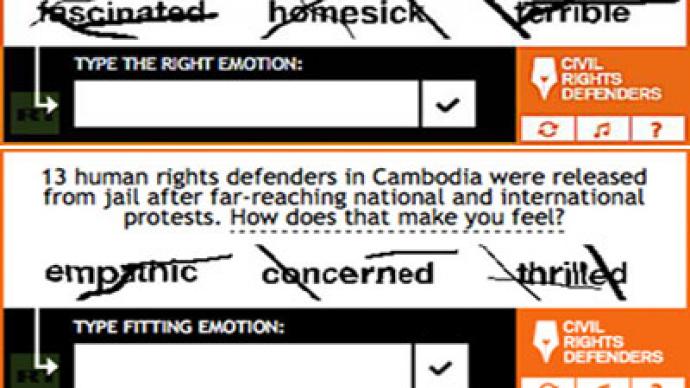Key(board) values: Internet users to pass human rights test to unlock sites

A Swedish civil rights group has unveiled a new CAPTCHA (a test that verifies a user is human before letting him enter a part of a website). Instead of trying to make out a scrambled word, users will now have to show an understanding of human rights.
For human users, CAPTCHAS (or Completely Automated Public Turing Test to Tell Computers and Humans Apart) are a constant nuisance, as web surfers reload, squint and hope they are typing the right word. But for website administrators they are a necessity, stopping automated programs, or bots, from registering accounts and then filling email boxes and forum walls with spam.Now, Stockholm-based Civil Rights Defenders has devised a CAPTCHA that allows people to show that their “empathy” is what makes them different from mindless robots.It presents users with various examples of human rights abuse.For example, “The Vice Minister of Defense in Albania, Ekrem Spahui, thinks gays should be beat up with a stick. How does that make you feel?”It gives them the option of “fascinated”,“homesick”, or “terrible”.Then it asks them to “type in the right emotion”.
For a supposedly ethical non-profit initiative, that allows web administrators who embed it in their services “to take a stand on human rights,” the CAPTCHA has aroused a decidedly mixed reaction among those who may have to use it.Some have praised the ingenuity of the Civil Rights CAPTCHA and its elegance in replacing meaningless letters with sharp reminders of worldwide issues that tend to drift to the back of media agendas.Others lamented the unnecessary politicization of a simple procedure in an internet environment already aflame with constant political conflict.“Some civil rights obsessive wants me to state my political views in order to enter websites. How does this make me feel?” wrote user Mr_Skagfsrwt on wired.com. “’Terrible.’, ‘Irritated.’, or ’Abusive’.”Some questioned if a CAPTCHA was the best mechanism for making a point, however worthy.“Empathy is, of course, an important and desirable quantity- one cannot behave decently without it, no one denies this” wrote user Matt Pickup.“But this ‘test’ is something else. It demands empathy through coercion.”Indeed, a statement on the Civil Rights Defenders website says “Only one answer is correct, the answer showing compassion and empathy” (though you do get another try if you type in the wrong answer).Users also noted that feelings on such issues as homosexuality, imprisoned politicians, or whether Belarussian leader Aleksandr Lukashenko should be allowed to stay as President for life (one of the real CAPTCHAS; the correct answer is “It makes me feel ‘low’”) might justifiably differ among internet users from different societies. Posing serious questions as to whether cutting off parts of the world that do not share certain is in the spirit of the internet.“One must toe the politically correct line or else be silenced,” sums up Matt Pickup.
The Swedish CAPTCHA is not the first attempt to create an alternative to letter recognition.One system uses images (say of cats or flowers) that users have to pair because they know are similar, but computers don’t. Another has a database of comprehension questions such as “The 6th letter in “unrolled” is?” Or “Which of 3, twenty-nine, 70, 46 or 65 is the lowest?” that would theoretically stump an unthinking mind.Despite their complexity, all of the commonly used systems are breached by tens of millions of bots daily. Bot operators build up a database of existing CAPTCHAS, forcing their makers to always stay ahead.With a database of just several dozen situations and words to describe them, the Civil Rights CAPTCHA will likely be easy pickings for those code-breakers. So, any ethical debates on it are likely to be moot, compared to whether the CAPTCHA will actually be adopted.














